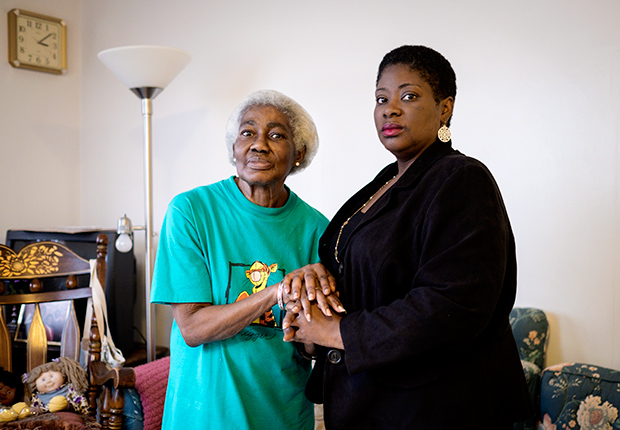AARP Eye Center

By Christina Hernandez Sherwood
Two years ago, Lorri Smalls left South Carolina for New Jersey to help care for her aunt, Terri Ago, who is in her 70s. The women share an apartment in East Orange and Smalls, 44, accompanies Ago to doctor appointments, cooks meals, mends clothes and assists her aunt with other needs.
Smalls said she volunteered for this role out of love, but has spent thousands of dollars along the way.
“Caregiving is a compassionate gift that you give to somebody else,” she said. “But you do pay a price, mentally and physically.”
Because of her role, Smalls would likely be eligible for an income tax credit under the proposed Caregiver’s Assistance Act, which officials expect to be introduced in the new legislative session in January.
The legislation would provide a credit of up to $675 per year for state residents who care for a family member 60 or older who lives with them at least six months of the year. The proposal includes income restrictions for both the caregiver and the family member.
Smalls, who is still paying off student loans, said the tax credit “would be a great boost.”
The legislation, backed by AARP, is meant to provide relief for some of the 1.1 million New Jersey residents whose unpaid caregiving is valued at $13 billion a year. That’s more than double what the state spends on Medicaid nursing home care, said Evelyn Liebman, AARP New Jersey manager of advocacy.
“The more that we can support these family caregivers and the work they do, the more we’re able to help people stay out of much more costly institutions,” Liebman said.
Sick days, family leave
The Caregiver’s Assistance Act is just one way AARP hopes to put caregivers at the forefront of the next legislative session, the first with the state’s new governor and legislature.
Also on the AARP agenda is an earned sick days bill. Most family caregivers work, Liebman said, and about one-third of New Jersey workers don’t have access to paid sick days, making the choice to take a day off to help a loved one difficult and risky.
Proposed legislation would allow all workers to earn paid sick days, accruing one hour of sick leave for every 30 hours worked, Liebman said. Small businesses would be allowed to provide fewer paid sick days.
Also in the works is a proposed expansion of New Jersey’s nine-year-old paid family leave insurance program. Liebman said a revamp of the law would aim to increase the current two-thirds wage replacement benefit and the current six weeks of paid leave, and to provide job protection.
It would also address the definition of a family member, she said, since about 15 percent of caregivers help nonrelatives, such as neighbors or friends.
Joseph V. Doria, a former Assembly speaker, said the caregiver and family leave measures would likely garner bipartisan support, but could be stalled by debate over how to pay for the changes.
“It’s all going to come down to the cost factor and the impact that it has on the economy,” said Doria, an adjunct professor at the Rutgers University Eagleton Institute of Politics and dean of the School of Education at Saint Peter’s University in Jersey City.
Christina Hernandez Sherwood is a writer living in Collingswood, N.J.























































